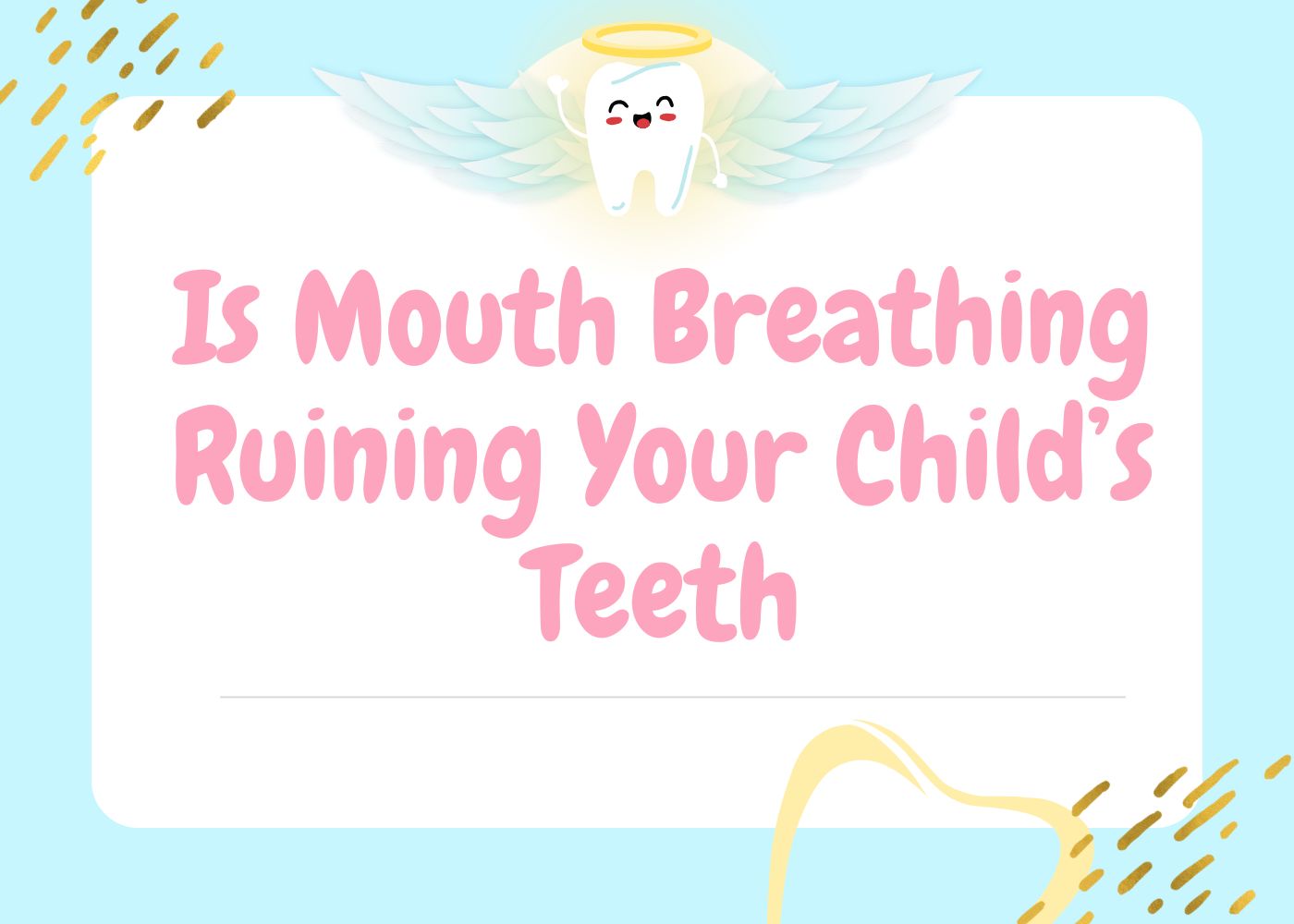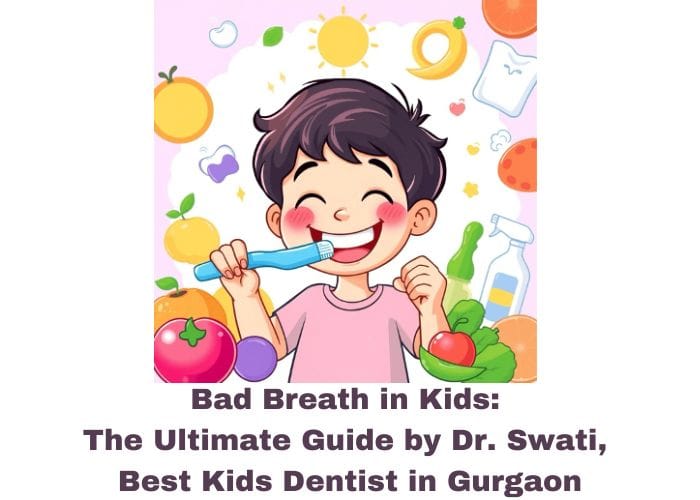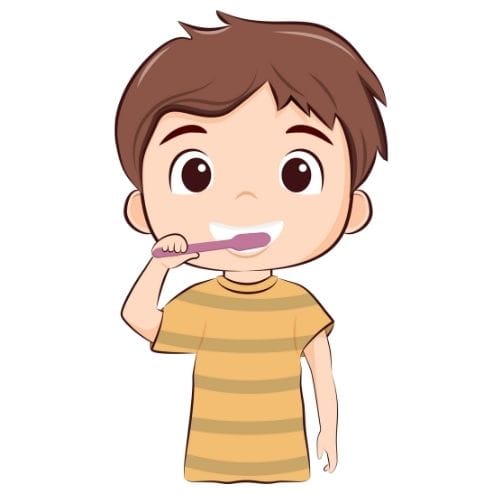

Bad breath in children, medically known as halitosis, is a common concern among parents. Understanding its causes and cures is crucial for maintaining your child’s oral health.
Halitosis refers to persistent bad breath that can stem from various factors, including poor oral hygiene and dietary choices. Addressing bad breath early can prevent potential dental issues, boost your child’s confidence, and promote healthy habits.
Introducing Dr. Swati, a leading expert in pediatric dentistry based in Gurgaon. With years of experience, she specializes in diagnosing and treating halitosis in kids. Dr. Swati emphasizes the importance of regular dental check-ups to ensure your child’s smile remains fresh and healthy.


Halitosis, commonly known as bad breath, can be distressing for both children and parents. Understanding the common causes of bad breath is crucial for maintaining children’s oral health.
The most prevalent cause of bad breath in kids is inadequate oral hygiene. When children do not brush and floss regularly, plaque accumulates on their teeth. This plaque harbors bacteria that produce foul-smelling compounds.
Certain foods contribute significantly to bad breath. Foods known for their strong odors, such as garlic, onions, and some spices, can linger in the mouth and digestive system.
Saliva plays a crucial role in maintaining oral hygiene by washing away food particles and bacteria. Conditions leading to dry mouth include dehydration or mouth breathing due to nasal congestion.
Recognizing these causes will empower you as a parent to take proactive steps in managing your child’s bad breath. Encouraging proper oral hygiene practices, monitoring dietary choices, and addressing any signs of dry mouth can significantly improve your child’s breath quality.
Bad breath in children can stem from various underlying issues beyond poor oral hygiene and dietary factors. Understanding these additional causes is essential for maintaining your child’s oral health.
Conditions such as tooth decay and gum disease significantly contribute to halitosis. Bacteria thrive in decayed teeth and infected gums, producing foul odors that linger in the mouth.
Regular dental check-ups are crucial for early detection and treatment.
Many children breathe through their mouths due to nasal congestion or allergies. This habit dries out saliva, reducing its natural cleaning ability. Saliva is vital for washing away food particles and bacteria that cause bad breath. Encouraging nasal breathing can mitigate this issue.
Enlarged tonsils or chronic tonsillitis can lead to persistent bad breath. The tonsils may harbor bacteria and food debris, creating an environment for odor production. Regular observation of your child’s throat health is important for addressing potential problems.
Incorporating these insights into your understanding of children’s oral health can help you identify the causes and potential cures for bad breath more effectively.
Understanding the less common causes of bad breath is essential for ensuring your child’s oral health remains optimal. While poor oral hygiene, dietary factors, and dry mouth are frequently discussed, other factors can contribute to halitosis.
Children often explore their environment with curiosity. Small objects lodged in the nose can lead to unpleasant odors that may be exhaled through the mouth. This situation can result in persistent bad breath if not identified and removed promptly.
Gastrointestinal issues can manifest as halitosis in children. Problems such as acid reflux or other digestive disorders may cause food particles to be regurgitated, leading to an unpleasant odor. These conditions highlight the connection between oral health and overall well-being.
Recognizing these rare causes allows for a more comprehensive approach to managing bad breath. Addressing misconceptions about halitosis is vital; it isn’t solely linked to diet or oral hygiene. The importance of monitoring your child’s health extends beyond maintaining a regular brushing routine.
Addressing bad breath in children requires proactive measures. Implementing effective prevention strategies is essential for promoting fresh breath and overall oral health.
Encourage your child to brush their teeth at least twice a day using fluoride toothpaste. Flossing daily removes food particles and plaque between teeth where toothbrushes can’t reach. Making this routine fun can motivate kids to practice good oral hygiene tips.
Focus on healthy eating habits for fresh breath in children. Fresh fruits and vegetables, particularly crunchy ones like apples and carrots, help to clean the mouth naturally. Limit sugary snacks and foods with strong odors, such as garlic and onions, which contribute to bad breath.
Hydration plays a vital role in preventing halitosis. Encourage your child to drink plenty of water throughout the day. This helps maintain saliva production, which is crucial for washing away food particles and bacteria. Consider sugar-free gum or mints as an alternative when water isn’t available, as they stimulate saliva flow.
Implementing these strategies can significantly reduce the risk of bad breath in children. Consistency is key to ensuring long-lasting fresh breath and healthy oral hygiene habits.
Identifying signs indicating persistent halitosis in children is crucial for intervention. If your child exhibits any of the following symptoms, it may be time to seek professional help:
The role of a pediatric dentist in managing bad breath issues in kids goes beyond simple assessments. They can provide tailored advice on:
Dr. Swati employs a comprehensive approach towards treating halitosis effectively. Her methods include:
Understanding the causes and cure for bad breath in kids is essential for parents. Consulting an expert like Dr. Swati ensures your child receives the necessary care and support to overcome this common issue.
Persistent bad breath in children requires a comprehensive approach to treatment. At Dr. Swati’s clinic, several options address the underlying causes of halitosis:
Dr. Swati offers targeted treatments for problems like tooth decay and gum disease. These conditions often lead to bacterial growth, a primary contributor to bad breath. Restorative procedures, such as fillings or cleanings, can significantly improve oral health and reduce odors.
To maintain fresh breath, Dr. Swati recommends specific oral care products designed for children. These include fluoride toothpaste and alcohol-free mouthwashes that effectively combat odor while being gentle on young teeth and gums. Regular use of these products supports long-term oral hygiene.
In addition to professional treatments, Dr. Swati suggests various safe home remedies. Encouraging kids to drink plenty of water helps keep the mouth moist, while chewing sugar-free gum can stimulate saliva production. Foods high in fiber, such as apples and carrots, can also help clean teeth naturally.
With these options, parents can take proactive steps to manage their child’s bad breath effectively.
Regular dental check-ups with Dr. Swati are essential for maintaining good oral health in children. These visits can help identify the causes and cure for bad breath in kids, ensuring any underlying issues are addressed promptly.
Establishing these routines not only combats bad breath but also contributes to overall dental wellness. Dr. Swati emphasizes the importance of proactive care, empowering parents to take charge of their child’s oral hygiene.
WhatsApp us